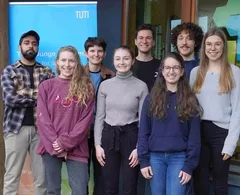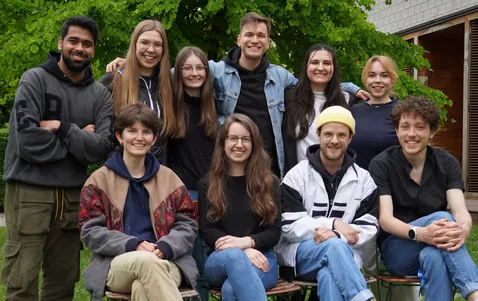Somnoactive

Our goal
Poor sleep is a major problem in today's fast-paced modern society, reducing productivity, affecting social relationships and causing numerous health problems. The aim of Somnoactive was to create an effective routine that promotes regular and improved sleep and therefore overall wellbeing.
Our hypothesis was that by following a short, low-threshold daily exercise routine that includes strength, stretching and mindfulness exercises, along with scientifically proven measures to enhance the circadian rhythm, we can impact people's sleep in a positive way. Among other things, we hope to reduce the time it takes the participants to fall asleep, reduce the number of times they wake up during the night, increase the feeling of restfulness in the morning and reduce the feeling of tiredness during the day.
How did we achieve that?
In summary, our student research project aimed to create an easy-to-implement daily routine that promotes effective sleep. By combining a daily exercise routine with scientifically proven measures, we tried to impact participants' sleep quality. Furthermore, we studied how motivation to follow the sleep improvement routine is impacted by incentives for active reflection and feedback on already achieved progress.
During the 30-day study period, participants followed our short daily morning exercise routine and were provided with suggestions for improved sleep hygiene. Sleep specific data was collected before, during and after our intervention period using sleep trackers. Whereas one study group was encouraged to actively reflect on their sleep by filling out a daily questionnaire, the second group additionally got weekly feedback on their progress, while a control group only followed the 30-day program without further reflection incentives or feedback.
Outcome
A significant improvement in sleep quality, evaluated with the Bergen Insomnia Scale (BIS) questionnaire, was noted in participants identified as ”insomniacs” at the beginning of the study. This provides evidence that the multi-component intervention including sleep education, physical exercise, and relaxation techniques, has a positive impact on subjects suffering from insomnia. Study groups receiving incentives for active reflection by filling out a sleep diary, or furthermore even receiving feedback on sleep improvements, showed a higher motivation for study continuation and therefore a lower drop-out rate.
Cross-cultural differences in sleeping habits - Germany vs. Ghana
Besides conduction of the study in Germany we investigated how sleep routines and habits, motivation, and knowledge vary between different regions of the world, specifically Germany and Ghana. Therefore, a part of our group travelled to Kwame Nkrumah University of Science and Technology in Ghana, a partner university of Technical University of Munich, where the study was repeated.
Research Report
Our Team
- Florian Brandl (Data Engineering & Analytics)
- Vedant Gupta (Aerospace)
- Johann Ioannou-Nikolaides (Physics)
- Samira Körner (Life Science Biology)
- Vivian Meier (Chemistry)
- Luisa Metten (Aerospace)
- David Schuster (Electrical Engineering and Information Technology)
- Lena Straßer (Sport Science)
Tutors
- Genoveva Müller
- Elisa Rodepeter
Supervisors
- Prof. Dr. Philipp Reiß Professorship of Lunar and Planetary Exploration Technologies
- Prof. Dr. Manuel Spitschan Professorship of Chronobiology & Health
Contact us
E-Mail: somnoactive@ja.tum.de
Impressions




